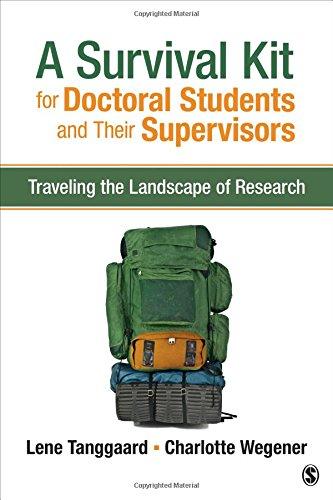In A Survival Kit for Doctoral Students and Their Supervisors: Traveling the Landscape of Research, Lene Tanggaard and Charlotte Wegener offer a hands-on guide for both students and supervisors that seeks to engage with the ‘actual and messy practices of doctoral training’. Contributing to an already dense field of literature on the research process, the book is at its most engaging and involving when it draws on personal anecdotes, case studies and email exchanges and risks reflecting on moments of failure as well as success, finds Sroyon Mukherjee.
A Survival Kit for Doctoral Students and Their Supervisors: Traveling the Landscape of Research. Lene Tanggaard and Charlotte Wegener. Sage. 2016.
 When I am not really in the mood to do actual research, one of my favourite procrastination strategies is to read books on how to do research. (Ironically many of these books in turn offer tips on how to avoid procrastination.) Fortunately or unfortunately, there is a multitude of websites, articles and books offering advice on every conceivable aspect of doctoral research, not to mention articles about books about doctoral research. Therefore a new entrant to the field must work hard to distinguish itself, and in A Survival Kit for Doctoral Students and Their Supervisors, Tanggaard and Wegener claim that their ‘intention is to get closer to the actual and messy practices of doctoral training than many “how-to” books ever come’ (5).
When I am not really in the mood to do actual research, one of my favourite procrastination strategies is to read books on how to do research. (Ironically many of these books in turn offer tips on how to avoid procrastination.) Fortunately or unfortunately, there is a multitude of websites, articles and books offering advice on every conceivable aspect of doctoral research, not to mention articles about books about doctoral research. Therefore a new entrant to the field must work hard to distinguish itself, and in A Survival Kit for Doctoral Students and Their Supervisors, Tanggaard and Wegener claim that their ‘intention is to get closer to the actual and messy practices of doctoral training than many “how-to” books ever come’ (5).
How successful is their endeavour? Before addressing that question, I would briefly note that the book is different in at least two other ways. First, unlike most books in what may be called the ‘doctoral self-help genre’, Survival Kit addresses both students and supervisors. Second, the authors are both professors in the Department of Communication and Psychology at Aalborg University, but it turns out Tanggaard was Wegener’s doctoral supervisor, and this allows them to draw on a number of shared anecdotes and insights.
In Chapter One, which spells out the theoretical basis of the book, the authors argue for an ‘apprenticeship perspective on doctoral training and supervision’ (1). But what does this mean, and how does it differ from conventional ideas about doctoral research? The apprenticeship perspective, we are told, involves ‘an emphasis on research as a result of yearlong practice and involvement in research environments’ (1). Its central idea is that ‘more experienced people assist less experienced ones, providing structure and examples to support the attainment of goals’ (3), and that it ‘builds upon a perception of research as grounded in activities that are associated with established knowledge and intuitive expertise’ (7).
 Image Credit: (Jeremy Segrott CC BY 2.0)
Image Credit: (Jeremy Segrott CC BY 2.0)
The exposition, as is perhaps apparent from these excerpts, is couched in rather abstract terms which may be confusing – or worse, off-putting – for readers without a background in education theory. Nonetheless, it is an interesting premise. It draws on the work of Tanggaard and Wegener’s late colleague, Steinar Kvale, who argued for the extension of the apprenticeship paradigm to academic research. Kvale, in turn, was inspired by Lave and Wenger’s theory of situated learning, which may be defined as ‘learning that takes place in the same context in which it is applied’. Here, learning is seen not as a transfer of abstract knowledge from master to student, but as a product of ‘legitimate peripheral participation in communities of practice’ (Lave, 1991).
But a book such as this must ultimately be judged on the quality of its advice; its theoretical underpinnings are of secondary importance. Accordingly, the practical implications of the apprenticeship perspective are explored in Chapters Two to Eight, which offer advice on a range of topics from choosing a supervisor all the way to finalising the dissertation.
Each chapter begins with an abstract and ends with bullet-point suggestions for the PhD student and the supervisor. Some suggestions are too vague or general to be of real value (‘Make sure to get the best out of the research landscape you are now part of’ (15)), but others are genuinely useful (‘Embrace confusion and uncertainty; and seek out ways to mine these feelings for research gold – keep a “confusion diary,” […] or invite people you like to a “getting lost study group”’ (155)). For me personally, one piece of supervisor advice came as a pleasant surprise: ‘Use creative [feedback] practices as they do at London School of Economics’ (136).
Curiously, when it comes to substantive content, the authors seem to switch between two distinct modes of presentation. There are whole sections which read like a review of theoretical literature, more appropriate to a research article than a book of this kind. For instance:
Jazvac-Martek et al. (2011) note that doctoral students’ academic futures depend on their ability to extend and maintain a network of relationships. McAlpine, Paulson, Gonsalves, and Jazvac-Martek (2012) point to the fact that students who completed their theses were able to operate independently but sought the emotional support of others… (81)
I could not resist comparing this passage with Umberto Eco’s equivalent advice in How to Write a Thesis: ‘Do not play the solitary genius.’
Doctoral students are well accustomed to making sense of dense academic prose, but Survival Kit would be much more readable if the theoretical digressions and extensive references were dealt with in the first chapter, consigned to the endnotes or, in some cases, omitted altogether. On the other hand, some of the direct quotes (as opposed to paraphrased conclusions) are truly illuminating: ‘I write in order to learn something that I did not know before I wrote it’ (80, quoting Laurel Richardson).
The book is much more successful when the authors write in the second mode, which is a combination of personal anecdotes, case studies and freewheeling reflections – in short, where they show rather than tell us about good doctoral and supervisory practice. Chapter Seven, which is about feedback, quotes a series of emails between Wegener and a journal editor, giving us a rare glimpse into the dreaded peer review process. The authors also include instructive first-hand accounts from colleagues: this is in keeping with the idea that ‘peers and masters are everywhere’ (the title of Chapter Five). As someone who changed his research topic halfway through his first year, I particularly identified with ‘Sven’s story about jumping on the right train’ (26–27).
Success stories like that of Sven are typically more widely reported than stories of failure, so I was intrigued by Rasmus Birk’s account of being dismissed from a research position, from which the authors draw the heartening conclusion: ‘failure is not the end of the world’ (30). I for one would welcome the inclusion of more such stories and advice on ‘what not to do’, as a counterpoint to the book’s many positive narratives and constructive suggestions.
Some doctoral theses are destined to become classics, while many others, depressingly, gather dust in departmental archives. So it is with doctoral advice books. Few can match up to the timeless appeal of Umberto Eco’s How to Write a Thesis or Howard Becker’s Writing for Social Scientists, but this does not mean there is nothing left to be said on the subject. Survival Kit is perhaps a book to be skimmed rather than read from cover to cover – the dry theoretical passages are best left alone, but some of the anecdotes, case studies and email exchanges really do allow us to get ‘closer to the actual and messy practices of doctoral training’.
Sroyon Mukherjee is a PhD candidate in the Law Department at LSE. His research investigates the role of judges in the valuation of natural resources. He is currently President of the LSESU Beekeeping Society. Read more by Sroyon Mukherjee.
Note: This review gives the views of the author, and not the position of the LSE Review of Books blog, or of the London School of Economics.








This article is a game-changer. I’ve gained so much knowledge from reading it. Thank you! To explore further, click here.